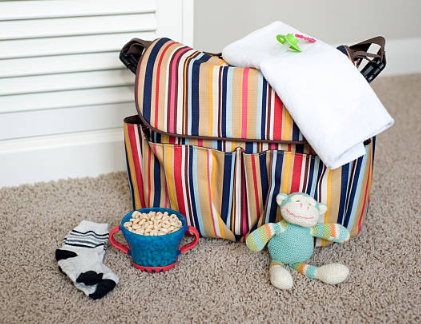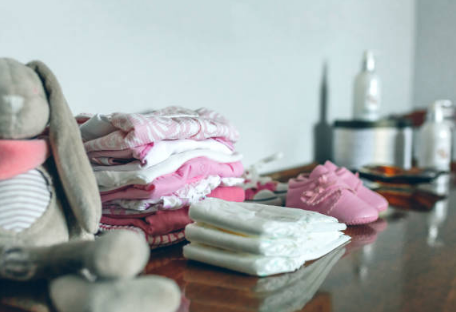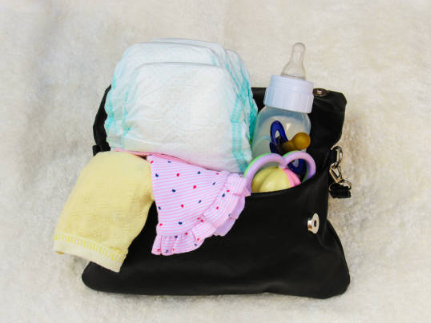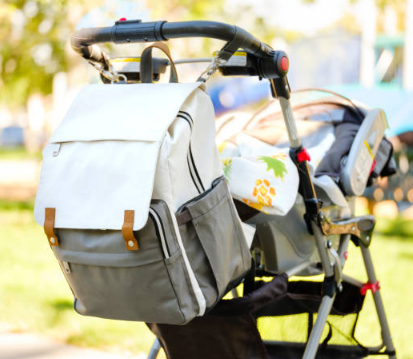Your baby’s diaper bag is more than just a handbag, it’s a decluttering tool that allows you to leave the house with confidence. Still, knowing what to pack in a diaper bag is a challenge.
“Parenting isn’t easy,” says Li Meng, founder of Huhu, a childcare products brand. “Organizing diaper bags minimizes a child’s emotional breakdown and lightens the mental load on parents.”
To help you keep your diaper bags well-packed and organized, we reached out to parents and experts for their recommendations. From must-haves to a few surprises, here are the items you should put on your diaper bag list and what you should leave at home.
What’s in a Diaper Bag
When packing a diaper bag, you don’t want to forget the essentials, but you also don’t want to overdo it. After all, over-packaging can be tempting. The key is to find a balance between making sure you have everything and showing some restraint.
“There’s nothing worse than being stuck in a restaurant or car in a wet diaper and realizing you don’t have what you need,” says Louise Ulukaya, a mother of three in New York City and founder of Mon Coeur, a sustainable baby brand. “That’s why before I leave the house, I always use the ABCD-POW for a simple check-up, which stands for Aid, Bag, Cream, Diapers, Powder, Onesies, and Wipes.”
Experts like Ulukaya each have their own “must-have” knowledge of diaper bag essentials, and we’ve fused it all together to form the ultimate diaper bag list. Of course, you may need to adjust this list to suit the season or your child’s specific needs.

Diaper
There’s a reason why the object where your baby’s belongings are stored is called a “diaper bag.” You need quite a lot of diapers in your pantry, especially since small children get more than one diaper soiled every day. The American Academy of Pediatrics (AAP) estimates that babies need 3,000 diapers in their first year alone!
“My rule of thumb with babies is to bring a diaper every two hours away from the house,” she said. Lee said. “For toddlers who don’t make wet or dirty diapers as often as babies, I usually carry two to three diapers a day. However, I prefer to bring more diapers than you might need, just in case.”
Parents should also prioritize wipes on their diaper bag list. Instead of using those big, bulky packages, consider buying travel sizes and refilling them when they’re empty. Or just put some wipes in a sealed bag.
“You never know when ‘poop explosion’ is going to happen,” so bring more wipes than you think you’ll need,” Lee advises. “I love Butipods reusable, stay-wet wipes bags, but Ziploc bags with 15 to 20 wipes will do just fine.”
Diaper Changing Pads
Parents have mixed feelings about changing diaper pads, but they can be very useful if the diaper is dirty. They are also very useful when you need to change your baby’s diaper in a public place, especially if you are carrying disposable changing mats that you can throw away when you’re done.
“Portable diaper changing mats and hand sanitizer make diaper changing easy for non-bathroom nappers, and there’s a wet bag for storing dirty clothes,” said Karen Reardanz, editor and brand director at Babylist.
Milk and Feeding Supplies
Depending on how you feed your baby, you may need some formula, a nursing hood, or you may need a burp cloth, says Talitha Phillips, CEO of Claris Health and Licensed Midwife and Postnatal Doula Services. The feeding items you bring will also vary depending on how many children you have and what they eat or drink.
“If you have a baby, be sure to prepare enough milk according to your baby’s feeding schedule and time you’ll be out,” Lee said. “If you’re breastfeeding, consider bringing nursing pads and a cover – whatever you need to feel comfortable while feeding.”
Change of Clothes
You never know when your baby will burst or spit on a diaper. In addition to a clean jumpsuit, you may want to bring an extra pair of pants, socks and a shirt just in case, Lee says.
“I always remind new parents not to overdo it and to hide an extra one-piece or outfit because explosions and chaos do happen,” says Amy Lundy, founder of Mother of All Baby Showers. “Don’t be stressed, just be prepared.”

Toys and Small Books
Young babies love to observe their surroundings, observe others, and check their toes, but as they get older, they also benefit from developmentally appropriate toys. 2 This is where providing small toys or cardboard books will come in handy. “Portable toys and little books can keep your baby in the stroller or in the dining room,” Lee says.
Blanket
Blankets are very useful for wrapping your baby in swaddling clothes, and you can place the blanket on the floor of a friend’s house so that you can use it while lying on your stomach. Lee says she prefers breathable muslin blankets. “It’s a versatile item that can be used as a swaddling cloth, a light blanket, a stroller visor, or as a makeshift burp cloth,” she says. “You can’t go wrong with Aden and Anais blankets. ”
Comfort
If your child has a favorite comfort item, such as a pacifier or a cute item, don’t forget to put it in the diaper bag, Lee says. Having these items on hand can help your baby feel safe and happy away from familiar surroundings.
Reardanz recommends preparing specific pacifiers and small toys specifically for diaper bags. “Having a diaper bag that is always ready to go means you have one less thing to think about when you’re trying to get out of the house.”
Snacks
Babies usually start eating solid foods around 4-6 months, depending on how prepared they are. 3 They will love to snack, especially as they enter early childhood, so have enough snacks on hand just in case.
“Bring a lot of snacks – more than you think they’ll be able to eat,” Lee advises. “Some of the snacks I like to pack include fruit, puree bags, biscuits, and cheese sticks.”
Just make sure what you’re packing is appropriate for your child’s eating tips. Food should not be a choking hazard; For example, the American Academy of Pediatrics recommends avoiding any food that is round, hard, slippery, or chunky.
Plastic Bag
Sometimes, when you’re out and about, there’s no place to dispose of your baby’s dirty diaper. Therefore, Lee recommends tossing a roll of dog poop bags or an empty plastic grocery bag into a diaper bag.
“At first glance, it seems like an unusual item,” she said. “However, if you can’t find a trash can and want to isolate your dirty items from other items, using single-use plastic bags to store items like dirty diapers, dirty clothes, banana peels, and snack wrappers can come in handy. Stuff.”
First Aid Kit
Abrasions and cuts are common, so consider preparing some band-aids and antibiotic ointments. It’s also a good idea to keep some diaper rash cream in your bag. If your baby has hip pain while you’re away, you can treat it right away instead of waiting until you’re home.

Provide Water and Snacks for Caregivers
Also, think about what you need when you’re out and about. Reusable water bottles and some treats can be a lifesaver that will keep you looking your best while caring for your baby. “We are often so focused on packing things for babies that we forget to pack for ourselves,” Lee said.
Wallets and Mobile Phones
Needless to say, when you leave the house, you will need a wallet and a mobile phone. But in the rush out of the house, it’s easy to forget these things. “Because diaper bags sometimes replace your wallet, you’d be surprised how many people forget to bring their wallet,” Phillips said.
Consider hanging the key on the carabiner hook and attaching it to the strap on the bag or to the loop inside the bag. They’re easy to find when you need them!
Self-Care Products
Whether you’ve just given birth or you’re a seasoned professional, it’s important to be prepared for personal surprises, such as unexpected menstrual periods. “After giving birth, you often don’t know when your first period is going to surprise you,” Phillips says.
You may also need to bring yourself an extra set of clothes in case your baby spits on you. “When you pee, poop or vomit, it can be helpful to wear an extra shirt for yourself,” Phillips added.
If you’re worried about whether your clothes will fit in your bag, choose a pair of thin leggings and a shirt that doesn’t take up too much space. Or, if you have a car, leave a spare set of clothes just in case.
You should also bring anything you might need throughout the day, such as lip balm, sunglasses, and sunscreen. “It’s easy to forget these items,” Lee said. “But it’s also important to carry personal care items like sunscreen, hand sanitizer and ointments with you.”
Tips for Organizing Diaper Bags
Keeping your diaper bag clean and organized will make your life less stressful. While there are multiple ways to do this, most of our experts recommend cleaning and refilling your diaper bag as soon as you get home.
Ulukaya also recommends buying a high-quality and lightweight bag that allows you to organize all your essentials. “The key is to have clear compartments to separate items and reduce zippers that add unnecessary pressure.”
Here are some extra tips to keep your diaper bag organized, clean, and ready to use in a pinch.

Choose the Right Diaper Bag
Lee recommends avoiding bags that only have one main compartment. It’s easy to lose things or make a mess of your bag. Instead, buy diaper bags that have features like pockets or storage bags.
“I love a diaper bag that’s already organized, it takes the guesswork out of it, and there’s a plus point to a diaper bag that’s easy to clean and has a built-in antimicrobial space,” says Lundy. “I highly recommend a bag with pockets and zippers, as well as compartments to organize while keeping items such as wallets, keys and phones separate from the child’s stuff.”
Keep Everything at Your Fingertips
Diaper bags are most useful when you can easily find what you’re looking for, says Reardanz. “Having to rummage through the pacifier in your bag when your baby is crying in a restaurant will only add stress to your situation.”
Lee suggested “archiving” the items in the bag instead of stacking them on top of each other. When things are stacked on top of each other, it’s hard to find them, so keep them in your bag like a folder, she says.
Take Advantage of Organizational Tools
Lee recommends using the pockets and bags in your bag to keep your belongings organized and avoid throwing everything into the main compartment. You can also buy products such as pacifier boxes or pouches, diaper chain packs, and other finishing tools.
“When choosing a diaper bag, consider how many pockets and compartments it has,” says Reildanz. For example, knowing that you always have hand sanitizer and diaper cream in your left inner pocket can make it easier when changing diapers” I was in an unfamiliar environment with a squirming baby by my side. ”
Repack Your Bags After You Go Out
Lee advises resetting the diaper bag after every time you go out. “To keep your diaper bag clean and tidy, remove snack wrappers and dirty laundry after each outing. Refill items such as wet wipes and replace dirty clothes with clean clothes. ”
Lundy said packing her diaper bag the night before would make her feel at ease the next day. But remember that life happens, and you may forget something. Try not to be stressed, as you can usually find what you need when you’re out and about.
